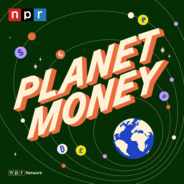Note: This episode originally ran in 2015.German families in the 60s loved tasty, cheap American-raised chicken that was suddenly coming in after the war. And Americans were loving fun, cheap Volkswagen Beetles. This arrangement was too good to last.Today on the show, how a trade dispute over frozen chicken parts changed the American auto industry as we know it.This episode was reported by Robert Smith and Sonari Glinton. It was produced by Frances Harlow. Help support Planet Money and get bonus episodes by subscribing to Planet Money+ in Apple Podcasts or at plus.npr.org/planetmoney.Learn more about sponsor message choices: podcastchoices.com/adchoicesNPR Privacy Policy

Wirtschaft
Planet Money Folgen
Wanna see a trick? Give us any topic and we can tie it back to the economy. At Planet Money, we explore the forces that shape our lives and bring you along for the ride. Don't just understand the economy – understand the world.Wanna go deeper? Subscribe to Planet Money+ and get sponsor-free episodes of Planet Money, The Indicator, and Planet Money Summer School. Plus access to bonus content. It's a new way to support the show you love. Learn more at plus.npr.org/planetmoney
Folgen von Planet Money
355 Folgen
-
Folge vom 31.01.2024The Chicken Tax (Classic)
-
Folge vom 29.01.2024Bonus: Janet Yellen on Wait Wait...Don't Tell Me!Our friends at NPR's news quiz Wait Wait...Don't Tell Me! recently had a very Planet Money guest on their show: Treasury Secretary Janet Yellen. They asked her about smoking pot, her extremely high scores in Candy Crush, and when to expect the Harriet Tubman $20 bill.Today, we're sharing an excerpt of that episode with you, along with some exclusive questions just for Planet Money listeners.You can listen to the full show and subscribe to Wait Wait...Don't Tell Me! wherever you find your podcasts.Help support Planet Money and get bonus episodes by subscribing to Planet Money+ in Apple Podcasts or at plus.npr.org/planetmoney.Learn more about sponsor message choices: podcastchoices.com/adchoicesNPR Privacy Policy
-
Folge vom 27.01.2024Rescues at sea, and how to make a fortuneAt around 1 a.m. on the morning of November 15, 1994, Captain Prentice "Skip" Strong III woke to a distress call. Skip was the new captain of an oil tanker called the Cherry Valley. He and his crew had been making their way up the coast of Florida that evening when a tropical storm had descended. It had been a rough night of 15 foot waves and 50 mile per hour winds.The distress call was coming from a tugboat whose engines were failing in the storm. Now adrift, the tugboat was on a dangerous collision course with the shore. The only ship close enough to mount a rescue was the Cherry Valley. Skip faced a difficult decision. A fully loaded, 688-foot oil tanker is hardly anyone's first choice of a rescue vessel. It is as maneuverable as a school bus on ice. And the Cherry Valley was carrying ten million gallons of heavy fuel oil. A rescue attempt would put them in dangerously shallow water. One wrong move, and they would have an ecological disaster on the order of the Exxon Valdez. What happened next that night would be dissected and debated for years to come. The actions of Skip and his crew would lead to a surprising discovery, a record-setting lawsuit, and one of the strangest legal battles in maritime history. At the center of it all, an impossible question: How do you put a price tag on doing the right thing?Help support Planet Money and get bonus episodes by subscribing to Planet Money+ in Apple Podcasts or at plus.npr.org/planetmoney.Learn more about sponsor message choices: podcastchoices.com/adchoicesNPR Privacy Policy
-
Folge vom 24.01.2024Hear us out: We ban left turns and other big ideasOn today's episode, we have three big economic ideas for your consideration – ideas that could potentially improve the economy and make us more efficient. First, what if we ban left turns on roads? Then, what if we gave every new baby ... a trust fund? And lastly, what if we completely got rid of U.S. congressional districts? That's all on today's episode. This show was hosted by Sarah Gonzalez. It was produced by Willa Rubin and Emma Peaslee with help from Sam Yellowhorse Kesler. It was edited by Dave Blanchard and engineered by Robert Rodriguez. It was fact-checked by Sierra Juarez. Alex Goldmark is Planet Money's executive producer. Help support Planet Money and get bonus episodes by subscribing to Planet Money+ in Apple Podcasts or at plus.npr.org/planetmoney.Always free at these links: Apple Podcasts, Spotify, Google Podcasts, the NPR app or anywhere you get podcasts.Learn more about sponsor message choices: podcastchoices.com/adchoicesNPR Privacy Policy
